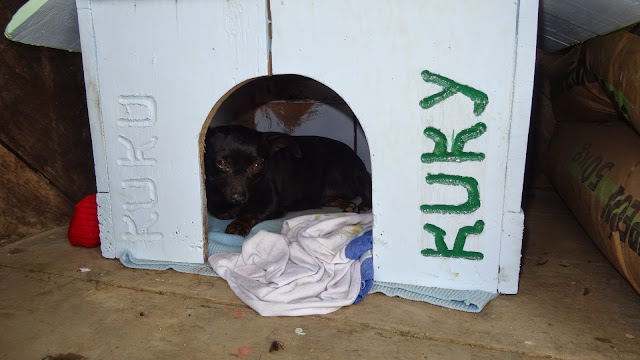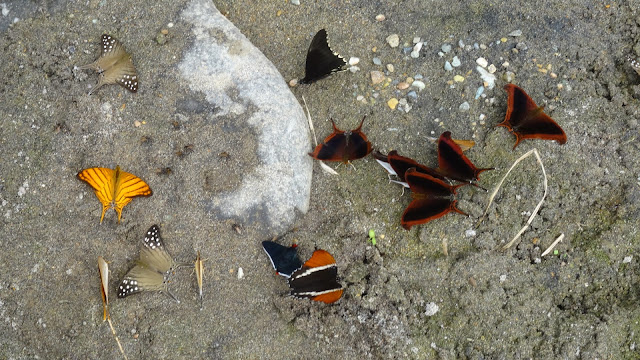We have just spent the last three weeks living in Las Tolas with our wonderful Ecudorian host family Cecila (mum), Edgar (dad) and their kids Henry (21), Alex (17), Pamela (who turned 15 on Wednesday), baby Carly (Cecilia's niece aged 18months from across the road who spent more time at our place than her own) and the pint-sized family dog Kuki. Las Tolas is a small community in the Ecudorian Cloud Forest and we enjoyed our time here immensely!
So what's a cloud forest?? It's kind of a tropical rainforest at elevation.. A group of mountains that are more often than not immersed in cloud. It's so cool, when you look up you can try and focus on one spot in the cloud but it's like an optical illusion and the water particles move rapidly away from you! The flora and fauna here are awesome too- the leaves are Kermit the Frog green and the size of fully grown humans, the flowers and bugs are iridescent and we have had sightings of bird-eating tarantulas (see video clip!) massive beetles, an otter in the river, hummingbirds stealing nectar and even a toucan!! It's a pretty incredible place to be.
The community of Las Tolas is made up of about 300 people, most of whom seem somehow related to each other. There is one dirt road, a few shops, an Internet cafe, a bar and a lot of chickens. Up until about a decade ago a major source of income for the community was forestry. However with the realisation of the damage to the environment and it's ecosystems that had occurred they decided they needed to reverse the affects and created a reforestation project. About ten of the families got together to set up the initiative and that's the main reason we ended up here, to volunteer with their reforestation program and help to preserve this precious part of the world.
Within our first 24hrs here we realised that there was not one person in the whole community that spoke English, which was going to make our time here somewhat challenging. We got our hopes up when one of our neighbours Mariana called by to offer us Spanish classes, but alas she didn't speak English either! We still took her up on her offer of lessons though. Needless to say each class has been challenging and exhausting but they force us to learn and our Spanish has improved drastically! I can now (kind of) speak in basic present tense and Ged knows past tense and is learning future!! I'm in awe of Ged's Spanish and don't know how I would have gotten by without his translations! Even in my simple Spanish it is such a thrill to be able to chat with our host family and the people here and it has really motivated me to keep practising. The dinner table is always a buzz with miscommunications and laughter and it really is very cool.
Now back to our volunteering... Firstly you should know that time in Las Tolas is similar to Fiji Time: It's very (very) relaxed. The only thing that is efficient is how many people they cram on a motorcycle! Siestas are an integral part of daily life and our volunteer time would have maxed at about 4hours on any given day. Our stay was much more of a cultural exchange than the hard-yakka volunteering we'd expected but after a whirlwind few months on the road, Las Tolas Time was exactly what the doctor ordered.
Each day we would have slightly different jobs; we made and painted wooden signs to identify the different species of plantlings in the vivero (nursery); we weeded, watered and replanted the plants that were big enough in the forest and it was pretty cool to see patches of trees that had been planted as part of the project 8 years ago and are now fully fledged forest. Ged spent more hours than I did working on the reforestation because I worked in the local primary school most afternoons teaching English. It was so great to be teaching again and the kids and I had a lot of fun communicating in Spanglish.
A few of the days we spent learning about different people in the community and helping them out a bit with their work. One day was spent with Sebastian on his coffee plantation picking the berries from the trees. The novelty of this wore off after about 10mins and a whole lot of spiders but 50kg of berries later and many hours of Hamish and Andy podcasts (they definitely saved the day) we were finished! We put the berries through a machine to collect the seeds and then put them in water to soak. After three washes the beans need to be dried for eight days before they can be sent off to be roasted. Whilst the job was tedious it was cool to learn about the process and made me think of the people around the world that have to do that job every day for hours upon end.
Another day we went to a sugar processing farm up the road. This was also really interesting. The family there feed the sugar cane through a machine to collect the liquid which in turn runs into big troughs to be heated by the boiler. They use what's left of the dehydrated sugar cane to fuel the huge fire and when the water has evaporated and the sugar remains they scoop it off the heat to cool before putting it into moulds. It is hot and sticky work and while it was fun to have a go and again fascinating I was so glad I don't have to do this every day to make a living! The family looked exhausted! Again it made us really think about how much we take for granted in life back home.
Los Tolas is such a tight-knit community and one of my favourite parts was how much down time they all spend with their family and friends. It really was the case if the village raising the child and after being here for weeks we still can't figure out whose kids are whose. The community all play soccer together and go in and out of each other's houses chatting and eating where the best meals being cooked...often our family's place (Cecila is a great cook and I have written down the empanada, sopa and salsa recipes to treat everyone to when we get home!!)
One afternoon we went to the cultural museum in Tulipe to learn about the Yumbo people who used to live in the area between 400-1600AD. We learnt that it was from their culture that Las Tolas derives it's name as a Tolas was the name given to the rectangular mound built ontop of a hill where the people would reside. A few of these Tolases are still able to be seen! Not heaps is known about the Yumbo culture because the people left the area following a volcano and amalgamated with Amazonian tribes however in recent years they have found many artifacts and we saw the ceremonial pools they built for initiation ceremonies still intact at the museum site.
Weekends at Los Tolas were again very chilled- we spent time hanging out with the family around the house, taking walks or going to the river for a swim or fish. We also had fun watching Edgar play the very confusing national sport (think tennis with a 20kg bat, a medium sized heavy ball and 6 people on each side). If you wanted to go out of town you pretty much needed to hitch-hike rides on the back of trucks or utes which was actually very easy and lots of fun. One Sunday we went into Mindo which is a bit of a tourist hub about an hour away. There we walked between six different waterfalls and had a go tubing down the river with a few of the other volunteers which was awesome fun! Another afternoon Henry taught Ged how to ride a motorbike (see video!)
On our last night our host family had a fiesta for Pamela's Birthday combined with a farewell for us and invited lots of the people. Chickens were slaughtered and ged did the honours of plucking the feathers! The Ecudorian asado was not quite as appetising as the Argentinian one (see pic) and included chicken feet, gizzards and intestines marinated in olive oil but with lots of cervesa and dancing the night was enjoyed by all!
We have learnt a lot from the community at Los Tolas and we loved being a part of their reforestation project. They are such a beautiful, warm and welcoming community and whilst we won't miss the 5am rooster wake-ups, we will treasure our time spent with our Ecudorian family in the cloud forest.

















































